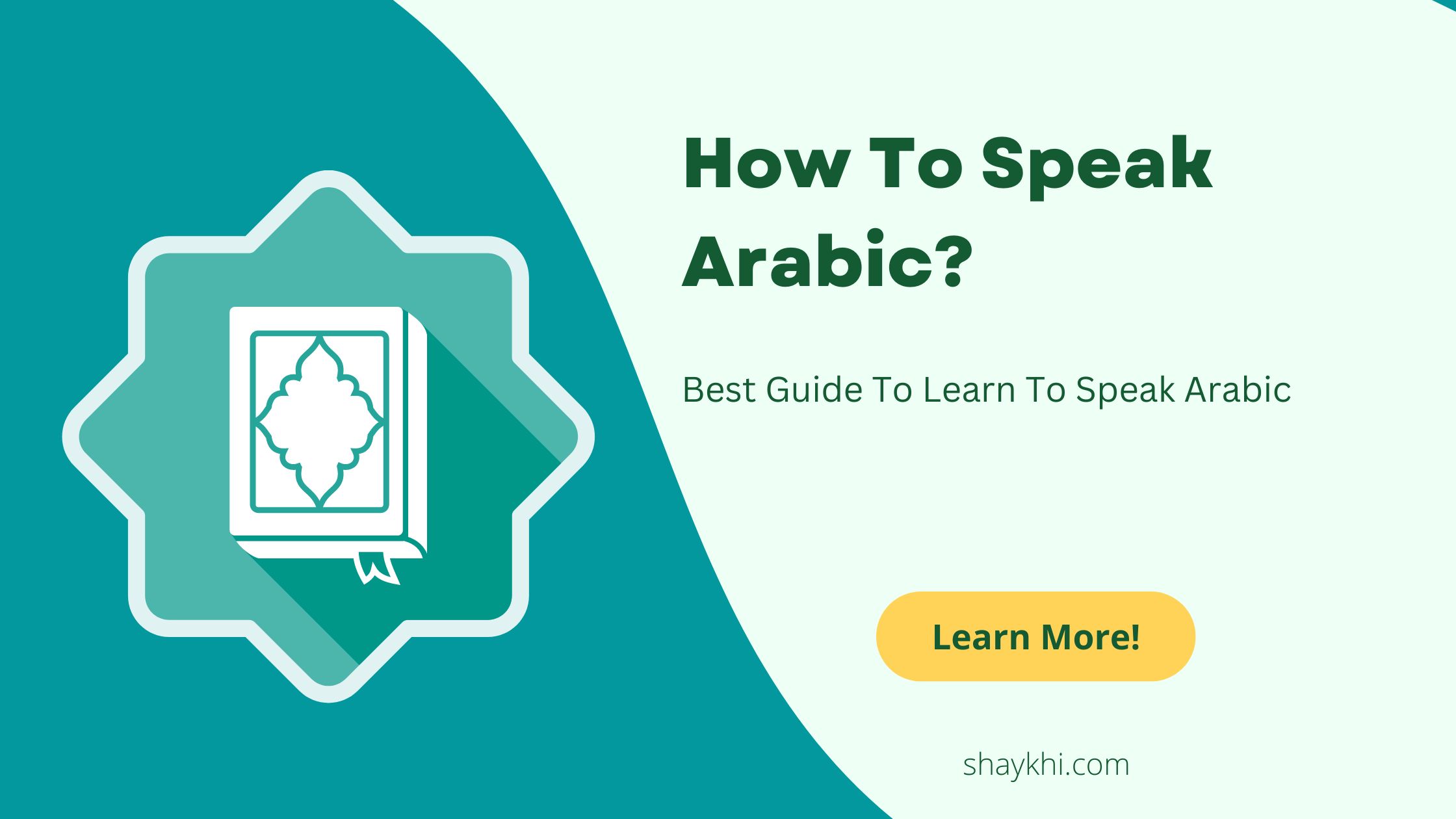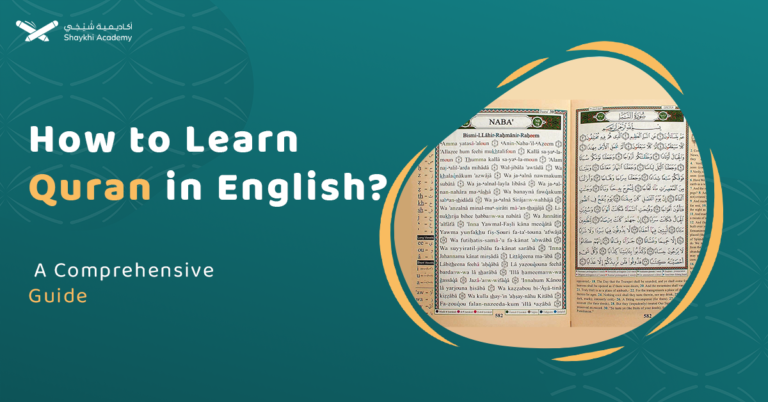Are you wondering how to speak Arabic? Do you struggle with Arabic speaking, despite being able to read and write efficiently? Here is your ultimate guide to learn to speak Arabic fast and without much effort.
Arabic is one of the Semitic languages spoken by approximately 200 million people around the globe. The Arabic language has many variations that are used within different contexts. It generally includes Quranic Arabic, and Modern Standard Arabic, in addition to more than six main local dialects spoken across the Arab world countries.
Learning to speak Arabic effectively requires to immerse yourself in Arabic media, practice regularly, and engage with native speakers. Utilizing resources like online courses, flashcards, and language partners can significantly enhance your skills. For a structured approach, Shaykhi Academy offers comprehensive Arabic courses, including Noorani Qaida, Fusha Arabic, and Quranic Arabic, guided by expert native tutors. Start your journey to Arabic mastery with a free trial class at Shaykhi Academy today!
What is Arabic Speaking?
Arabic Speaking refers to the practical skill of communicating verbally in Arabic, encompassing both Modern Standard Arabic (MSA) and various regional dialects spoken across the Arab world. While MSA is widely understood and used in formal settings, it is not commonly spoken in daily conversations, where local dialects dominate.
Learning to speak Arabic effectively involves understanding the differences between these forms and choosing which to focus on based on your goals—whether for formal communication or everyday conversation in a specific region. To develop fluency, consistent practice, immersion, and interaction with native speakers are crucial.
Note: it is worth knowing that Fusha Arabic is not natively spoken in any of the Arab countries nowadays, except within formal settings. Instead, local dialects are spoken depending on the region.
However, you could be clearly understood in any Arab country if you speak modern standard Arabic, though it may seem unnatural to most people.
How to Learn how to speak Arabic?
You might be also asking how do I start speaking in Arabic? The answer to this question is that learning a new language is no different from learning any other skill. It is a matter of “neuroplasticity”, as neurologists like to say!
This means, the more you practice, the more connections are built in your brain. Over time, you develop an unconscious ability to speak Arabic that enables you to communicate confidently in any situation you encounter.
How to know your level in Arabic speaking?
The best way to know your level in Arabic speaking is by asking a proficient native Arab to assess your Arabic speaking skills.
Another way is to take an Arabic language placement test to assess your exact level so that you can easily plan your study and set your learning priorities.
Shaykhi Academy can also help you assess your level. If you attend our free trial Arabic class with one of our experienced native tutors, you can easily get the feedback on your Arabic speaking skills and recommendations on how to improve them.
How can I learn Arabic speaking easily?
If you are intending to learn conversational Arabic in a given dialect you should first immerse yourself in watching and listening to the media. For instance, if you wish to learn Egyptian Arabic, then watching Egyptian media will be helpful.
Immersion is key to fluency. Also try to communicate with native Arab speakers of that dialect you wish to learn as well. This could be a friend, a teacher, or a native online tutor.
However, the best way would be to travel to that region and spend some time there, but that may not be an option for many people.
Moreover, learning basic grammar rules, commonly used Arabic phrases, and commonly used vocabulary is crucial in this case.
On the other hand, if you are planning to learn Modern Standard Arabic (MSA), you should primarily focus on studying Arabic grammar rules and structure. Since proper knowledge of the language rules is important for mastering MSA.
In all cases, finding a professional native teacher will help you greatly, as learning Arabic speaking on your own may be challenging.
Learn Commonly Used Arabic phrases
It is always beneficial to practice an imaginary scene that could take place in everyday life. Here are some phrases to begin with:
| phrase | Transliteration | Translation |
| أهلًا | Ahlan | Welcome |
| إسْمِي أَحْمَد | Ismi Ahmed | My name is Ahmed |
| مَا اسْمُك؟ | Ma ismuka? | What is your name? |
| كَمْ عُمرُك؟ | kam Omruka? | How old are you? |
| كَيْفَ حَالُكَ؟ | Kayfa haluka? | How are you? |
| أناَ بِخَيْر | Ana bekhair | I am fine |
| تَشَرَّفْتُ بِكَ | Tasharraftu bika | It is an honour to meet you |
| مَعَ السَّلامَة | Ma’a Assalama | Goodbye |
How to speak Arabic for free?
Learning Arabic speaking can be a bit tricky, however, with determination and perseverance, nothing is impossible!
Nowadays, with the availability of varied online resources and learning channels, you can easily learn Arabic without spending a penny. Here are some of the resources that could be helpful for you in your learning journey.
1. Books
Gaining enough knowledge of the fundamental theoretical Arabic language grammar and structure is essential before you start speaking Arabic. This knowledge can be acquired through reading Arabic books.
You can easily find free online books and resources that provide you with the basics of the Arabic language. You can also download Shaykhi’s free online Arabic book, Al-Menhaj For a better understanding of the basics of the Arabic language.
2. Online Resources
By surfing the Internet, you can access a wide range of educational resources that can help you with improving your Arabic speaking. These resources include audio materials, educational videos, and interactive applications, in addition to a variety of social platforms where you can communicate with natives from the comfort of your home and with minimal expenses.
3. Language Partners
Having language study partners is a good way to keep motivated while studying the Arabic language. So, I advise you to find a study group with which you can set your plans, discuss your challenges, and even celebrate your achievements.
4. Travel and Conversations
Immersing yourself in the Arabic language through traveling to Arabic-speaking countries is definitely one of the best ways to improve your Arabic speaking skills, especially if you are interested in local Arabic dialects.
5 Practical Drills to Master Arabic Speaking
Now, it’s time for practice. Let me suggest 5 easy drills that can help you hone your Arabic speaking skills. By adding these exercises to your everyday routine, you are most likely to achieve amazing results within a few weeks, inshallah.
1- The Flash cards method
Prepare a set of flashcards with a group of commonly used Arabic expressions. These cards are to be used daily to test your memory. Each time you get a card completely right, remove it and replace it with a new one, and so on.
By committing to this method, you can expand your knowledge of frequently used sentences. This will surely improve your Arabic speaking skills.
2- Set Your Timer and Speak!
This is the second drill that you can also do using your flashcards. The idea of this drill depends on recording the time taken to complete a set of correct flashcards,
Noticing the decrease in the time required to answer the whole set correctly. It is expected to take less time to correctly read your flashcards after several days of starting this exercise.
3- Speak to a visual partner
Another way to learn Arabic speaking is to make an imaginary conversation with a visual partner. This visual partner could be an object, a picture of your best friend, or even your pet. In this conversation, you will ask questions and reply to them.
By repeating this drill you will be able to expand your vocabulary and enhance your Arabic conversation level, which enables you to readily communicate in various situations you might face in your daily life.
4- Present out loud
Open your camera and record a 30-second video, describing what happened with you throughout the day. Then watch the video again and notice your mistakes or send it to a native friend to spot your weakness points.
By repeating this drill on a regular basis you can tremendously improve your fluency and pronunciation. Just make sure to speak loudly and with confidence.
5- Chat with a native speaker/Tutor
Actually, this is the most efficient way to learn Arabic speaking. Chatting with a native Arab friend or tutor can amazingly improve your skills in a way that is fun, interactive and less formal.
Master Arabic with Shaykhi Academy: Your Gateway to Fluency!
Are you eager to learn Arabic from the comfort of your home? Shaykhi Academy offers you the perfect opportunity to master Arabic, whether for Quranic studies, daily communication, or advanced understanding.
Why Shaykhi Academy?
- Expert Native Tutors: Learn from highly qualified native Arabic speakers.
- Flexible Scheduling: Tailor your classes to fit your busy life.
- Affordable Learning: Access top-quality education at a price that suits you.
- Global Access: Study from anywhere in the world.
Explore Our Arabic Courses:
- Noorani Qaida: Build a strong foundation in Quranic Arabic.
- Comprehensive Arabic Courses: Master the Arabic language, from beginner to advanced levels.
- Fusha Arabic Classes: Delve into Modern Standard Arabic, the key to understanding literature, media, and formal communication across the Arab world.
- Quranic Arabic Course: Enhance your connection with the Quran by learning the language in which it was revealed.
Start Your Arabic Journey Today! Whether you’re just starting or looking to deepen your knowledge, Shaykhi Academy is here to support your journey. Book your free trial now and begin your path to Arabic mastery!
To Sum Up!
The Arabic language is one of the most widely spoken languages worldwide. In addition to being one of the richest languages, it reflects the amazing Arabic and Islamic culture and heritage.
Before you decide on the best way to enhance your Arabic speaking skills you should first and foremost figure out whether you are intending to learn modern standard Arabic or a specific Arabic dialect.
In case you are intending to learn modern standard Arabic, which is clearly understood in all Arab countries, it is recommended to start with the basics of the Arabic grammar and vocabulary before you proceed with learning how to speak Arabic.
However, if you are planning to learn a specific Arabic dialect, you can mainly depend on the immersion method which requires extensive exposure to the intended dialect either in the media or by connecting with native Arab friends and tutors.













































